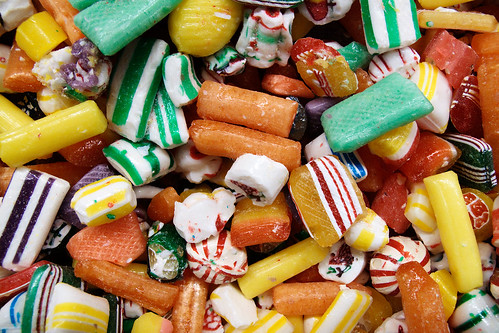
Not eating sugar, or even eating it in moderation, in the U.S. is a challenge. This is a society geared towards pushing sugar (especially refined sugar) on people. According to a document from the New Hampshire Department of Health and Human Services, "Two hundred years ago, the average American ate only 2 pounds of sugar a year. In 1970, we ate 123 pounds of sugar per year. Today, the average American consumes almost 152 pounds of sugar in one year. This is equal to 3 pounds (or 6 cups) of sugar consumed in one week!"
Part of how this plays out is the cultural demarcation of certain, usually extremely sugary, foods as "treats" (with the implication that all other food is dull drudgery). Once this demarcation is accomplished, all food-related discourse takes on a moral dimension, whether one is trying to avoid treats (penance, asceticism); having a treat as a "reward" for some other kind of food-related or exercise-related success (justice); "allowing" oneself a treat in difficult or stressful times (mercy); having a treat because one deserves it just for being you (goodness); or having a treat with self-consciously no justification (moral failure, self-indulgence).
I am curious if it is possible, through the forswearing of sugar, to break from even the "penance/asceticism" model of eating, and instead re-imagine one's relationship to all other food. Just as the former or potential drug addict may want to re-construct herself as being "high on life," perhaps there is a way of thinking of ALL food as a treat, and all nourishment as a delight.
On a related note, here's an old Guardian blog piece asking if there's a secular way to say grace.
"perhaps there is a way of thinking of ALL food as a treat, and all nourishment as a delight."
ReplyDeleteI like this very much...
Another concern I have about the normative popular nutritionist-approach to diet is in the reduction of food to their caloric content... Those that are "higher" in caloric content (or are likelier to lead to higher caloric intake, simply because of the amount of it that one will take of it in order to feel satiated) are either demonised or fetishised as "treats".